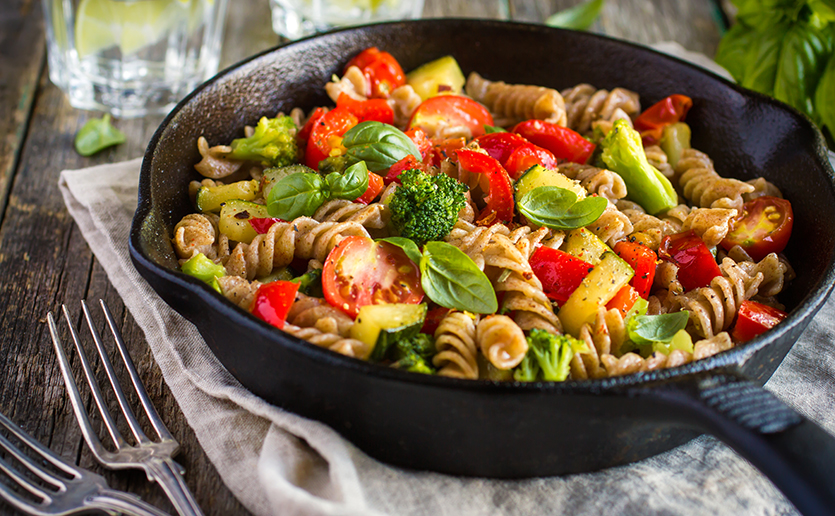Most of us have an idea of what a healthy diet looks like — chances are it includes items like kale salad and not chocolate chip cookies. It’s easy to get caught thinking in “good” and “bad” labels. Food is touted as fuel, but it is also so much more. It communicates love, celebration and comfort too.
While eating nutritious foods is a form of self-care, feeling guilty about what you eat is not. Comfort food, after all, can offer a different kind of wellbeing. Here’s how to reconcile these seemingly opposing notions.
Comfort Foods Can Stay
You don’t have to completely forgo these pleasurable foods, just clear a little more room for plants. Nearly 9 out of 10 Americans fall short on their daily vegetable intake and about 8 out of 10 aren’t meeting fruit goals. And this is all while roughly 7 out of 10 of us are getting more added sugar and saturated fat than is recommended. This doesn’t mean we have to demonize carbs and fat, but it does mean we could balance our diets a bit more.
While some cooks add “love” to their food, no one says they added guilt. So, try to keep it out of what you eat.
This strategy can be applied to pretty much anything you eat — especially classic comfort foods. It could be pairing a salad with a burger, instead of a side of fries. Or making a pan of roasted vegetables to toss into pasta salad. (Here’s a recipe for those vegetables.) Or even having a sliver of cake alongside a heap of summer berries, instead of the reverse proportions.
Think these small changes don’t make a difference? Research suggests otherwise. In fact, making moderate diet changes on a regular basis has been associated with a decreased risk of premature death. This is often done by reducing the size and/or frequency of a food that offers few health benefits (like fries) while increasing the presence of protective foods (like fruits, vegetables and whole grains).

• Cancer Prevention: Does The Food You Eat Play a Role?
• Healthy BBQ Choices for Summer
• Simple and Healthy Summer Desserts
There are other ways to work on this too. For instance, forming meat patties that are a quarter pound will also reduce your intake. (Those half-pound burgers offered at restaurants are closer to two servings.) This decrease allows space for, say, a salad to appear on the plate. They don’t all have to be kale-based either — try this one.
Be Mindful of Marketing
Foods with few nutritional benefits are increasingly marketed using terms that imply health, leading consumers to view them as beneficial. “Plant-based” has become a buzzword, but even chocolate can be promoted as such (it technically comes from the seeds of a cacao plant). This is not what researchers had in mind when they published evidence that plant-based diets were associated with a lower risk of heart disease and reduced body weight.
Diets high in processed plant-based foods (like chocolate-swirled almond milk ice cream) do not provide these benefits. We also run the risk of eating more and feeling less satisfied by consuming modified versions of what we really want. Plus, guilt can be reduced when we stop thinking these healthier versions are advantageous.
Give Food the Attention it Deserves
We often multitask when eating — this includes when working at a computer, standing in the kitchen, or snacking while watching television. All these behaviors reduce focus on the food, which can decrease satisfaction. The next time you plan to eat something you’d consider comfort food, try this mindful eating exercise:
- Sit down at a table without distractions (put the phone away too).
- Focus on the flavor and use all your senses to ask some questions:
-
- How does it taste? Smell?
- What is the texture? Does it crunch or crackle?
- Does the taste change as you eat? How does your first bite compare to your last?
- How do you feel after you are done?
These answers inform future decisions and may reduce how much you need to feel satisfied. They can also help foster enjoyment, which is the whole point.
Instead of trying to banish certain foods from existence, consider the context in which you are eating them. While some cooks add “love” to their food, no one says they added guilt. So, try to keep it out of what you eat.

Emily Gelsomin, MLA, RD, LDN, is a senior clinical nutrition specialist at Massachusetts General Hospital. As a registered dietitian, she counsels on medical nutrition therapy on an outpatient basis and is co-director of Be Fit, the hospital’s employee wellness program.
Jointly sponsored by The Clubs at Charles River Park and MGH Nutrition and Food Services, the 10-week program focuses on helping participants “Be Fit and Eat Right.” Every ten weeks, employees from different departments within the hospital compete with each other as they make a commitment to Be Fit. Through the creation of a social environment at the workplace, participants are supported to make progress in personal lifestyle changes with the help of a unique support system that includes a dedicated nutritionist and personal trainer.
Be Fit strives to create a milieu of wellness that extends beyond the 10-week curriculum by offering features to those who are not part of the intensive program. This includes the creation of Choose Well, Eat Well, a rating system designed to help both employees and patients increase awareness of healthy choices at retail eateries within the hospital. It also includes a monthly e-mail with a timely nutrition tip.



